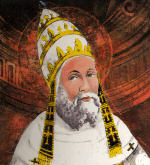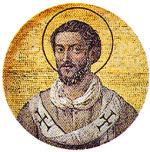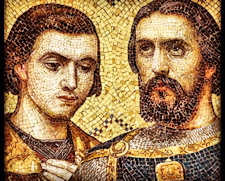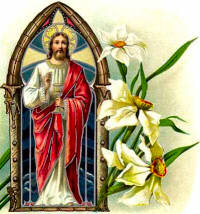Easter: April 22nd
Monday of the Fourth Week of Easter
Other Commemorations: St. Soter, Pope (RM); St. Caius, Pope (RM); St. Epipodius, Martyr (RM)
» Enjoy our Liturgical Seasons series of e-books!
The Roman Martyrology commemorates two pope saints, Soter and Caius, separated by a century. Pope St. Soter (d. 175) was the twelfth pope, and succeeded Anicetus as Pope in 166. He died a martyr in 175, under Emperor Marcus Aurelius. Pope St. Caius (d. 296) was the 28th pope. Caius governed the Church from 283 until he died on April 22, 296. The popes of the first centuries suffered the heavy anxiety of the persecutions which continually threatened their flocks; the pontificate of Caius, however, was marked by a long period of peace, some ten years before the terrible persecution under Emperor Diocletian.
The Church also commemorates St. Epipodius (d. 178), a young Christian man of Lyons, France—unmarried and of good position. During the fierce persecution of Marcus Aurelius in that city (178), with his friend St. Alexander of Lyon he was arrested, imprisoned, and finally brought before the governor. Their ready acknowledgment of being Christians elicited astonishment of the governor who was well aware of the fierce tortures and executions that had already been meted out to Christians. They were beheaded in the year 178.
Today is the National Day of Prayer and Remembrance for Mariners and People of the Sea (USA)
Meditation: Monday of the Fourth Week of Easter
Jesus, the Good Shepherd
1. Easter, the day of the Lord's victory over sin and hell, the day of our resurrection to a new life (through baptism and penance), today receives a new meaning. The risen Lord is the Good Shepherd who lays down His life for His sheep. With her heart filled with gratitude, the Church recognizes Jesus as the Good Shepherd. "The earth is full of the mercy of the Lord, alleluia; by the word of the Lord [I baptize thee; I absolve thee from thy sins; this is My body, and this is My blood] were the heavens [the redeemed] made, alleluia, alleluia. Rejoice in the Lord, O ye just [the redeemed, the Church!" (Introit).
2. Jesus is the Good Shepherd. "The good shepherd giveth his life for his sheep. But the hireling and he that is not the shepherd, whose own the sheep are not, seeth the wolf coming and leaveth the sheep and flieth; and the wolf catcheth and scattereth the sheep; and the hireling flieth because he is a hireling and he hath no care for the sheep. I am the Good Shepherd; and I know Mine, and Mine know Me, as the Father knoweth Me and I know the Father; and I lay down My life for My sheep" (Gospel).
The mark by which the good shepherd is to be recognized is his selfless zeal for the welfare of the flock that has been entrusted to him. His zeal makes him willing to sacrifice his life for his flock. It is otherwise with the hireling, who works for a fee, for he is a hireling whose own the sheep are not. When he sees the enemy, the wolf, coming, he does not place himself on guard. He will not risk his own life; he assures first his own safety, for he lacks a personal interest in the flock. There is still another mark by which the true shepherd may be recognized. He knows personally each of the sheep committed to his care. For him the individual sheep is not just one among many, as would be the case with the hireling. There exists between the individual soul and Jesus a union so personal and so intimate and trusting, that the union of the Father and Son in the Blessed Trinity is mirrored in it. The mutual understanding and love of the Father and Son are reflected also by this relationship between the Good Shepherd and His flock. Blessed are we, the baptized, the children of the Church, who have been entrusted to Jesus, the Good Shepherd. He lays down His life for His sheep. He guides each one of them, cares for them, and loves them with an intimate love, as though each sheep were His only care. What unquestioning faith and confidence we should have in the Good Shepherd!
"The Good Shepherd giveth His life for His sheep." As a matter of fact He is so concerned for our salvation that He descended from heaven, subjected Himself to suffering, and became obedient unto death for our sake. How zealously He has sought us out! He comes daily in the Mass in search of us; seeking us out, He enters our hearts each day in Holy Communion. He lives and prays for us unceasingly in the solitude of the tabernacle. He inspires us and enlightens us without ceasing, and is continually knocking at the door of our hearts with His grace. He consoles us, reproaches us, delights us, admonishes us, allows us to fall, and then raises us up; He protects us from ourselves and from our own evil inclinations, desires, and passions. "I am the Good Shepherd; and I know Mine." This assurance sustains us; for He is the Good Shepherd of my soul, and I am His chief concern. He knows me, all that is in me, both the good and the evil. His eyes follow me wherever I wander. When my way is through briars or painful thorns, He helps me; when I am in need, when I am troubled or in darkness, He comes to me. His heart beats for me, and He is always near me, even when I am obliged to go forth into a hostile world, and when I cry out in vain for love and sympathy.
3. "I am the Good Shepherd." He has risen; He, the Good Shepherd who seeks me so lovingly, lives. The man who possesses this living faith can never be poor, or homeless, or alone. There can never again be for him a sterile period, either in his heart or in his work. Let us live with the liturgy in the spirit of faith.
"I know Mine, and Mine know Me." Where? In the offering of true love. Only the spirit of sacrificial love can build a bridge between the Shepherd and His sheep. Only when love has been purified of all selfishness, can a true interior and vital union, based on perfect mutual understanding, be realized between the Shepherd and His sheep. No one can remain faithful unless he bears the imprint of the Lord's wounds in his heart. That is the mystery of the true shepherd, Jesus Christ.
—Benedict Baur, OSB, The Light of the World, Vol. 2.
Pope St. Soter
 St. Soter, the successor to Pope Anicetus, died a martyr's death in 175. He was noted for his kindness to certain Greeks who had been condemned to the mines because of their faith in Christ. When he ascended the chair of Peter he forbade consecrated virgins to touch the sacred vessels and palls, or to carry censers in church. He also obliged the faithful, except those in mortal sin, to receive holy Communion on Maundy Thursday. Soter is the author of a letter to the Corinthians.
St. Soter, the successor to Pope Anicetus, died a martyr's death in 175. He was noted for his kindness to certain Greeks who had been condemned to the mines because of their faith in Christ. When he ascended the chair of Peter he forbade consecrated virgins to touch the sacred vessels and palls, or to carry censers in church. He also obliged the faithful, except those in mortal sin, to receive holy Communion on Maundy Thursday. Soter is the author of a letter to the Corinthians.
Highlights and Things to Do:
- Read more about St. Soter:
- St. Soter is traditionally venerated as a martyr, but no historical information exists today. He was originally buried in the Callistus cemetery in Rome, Italy.
Pope St. Caius
 St. Caius (pope from 283 to 296) was closely related to the Emperor Diocletian. So that he might live to serve the faithful, he remained in concealment a long time and would not leave Rome. Ordinarily it was in the catacombs that he hid, and there he celebrated the holy mysteries and instructed many pagans. It was Pope Caius who decreed (according to the false Decretals) that the following steps must precede consecration to the episcopate: porter, lector, exorcist, acolyte, subdeacon, deacon, and priest. He died a natural death and was buried in the catacomb of Callistus on April 22. St. Susanna was his niece. Pope Urban VIII revived his memory in Rome by restoring his church, naming him as its patron saint, raising it to the rank of a station, and enriching it with the saint's relics.
St. Caius (pope from 283 to 296) was closely related to the Emperor Diocletian. So that he might live to serve the faithful, he remained in concealment a long time and would not leave Rome. Ordinarily it was in the catacombs that he hid, and there he celebrated the holy mysteries and instructed many pagans. It was Pope Caius who decreed (according to the false Decretals) that the following steps must precede consecration to the episcopate: porter, lector, exorcist, acolyte, subdeacon, deacon, and priest. He died a natural death and was buried in the catacomb of Callistus on April 22. St. Susanna was his niece. Pope Urban VIII revived his memory in Rome by restoring his church, naming him as its patron saint, raising it to the rank of a station, and enriching it with the saint's relics.
Symbols and Representation: pope with Saint Nereus
Highlights and Things to Do:
- Read more about St. Caius:
- St. Caius' relics have been translated from the crypt of St. Eusebius in the Cemetery of Callixtus to San Silvestre in Capite, then to another church, then to the private chapel of the Barberini princes in Sant'Andrea della Valle.
St. Epipodius
 Born during the 2nd century, St. Epipodius and St. Alexander of Lyon became best friends while growing up and attending school together. They were both raised Christian and shared a similar passion for their faith. It was not long until these two young men were put to the test during the reign of Marcus Aurelius.
Born during the 2nd century, St. Epipodius and St. Alexander of Lyon became best friends while growing up and attending school together. They were both raised Christian and shared a similar passion for their faith. It was not long until these two young men were put to the test during the reign of Marcus Aurelius.
At the time there was a great persecution underway, especially in their own city of Lyons. Epipodius and Alexander kept secret about their faith and sought to hide from the local authorities. A servant betrayed Epipodius and Alexander and reported them to the governor. They were to be arrested for their Christian faith but they heard about the order and immediately fled the city. They escaped to a nearby town and found refuge in the house of a Christian widow. The two friends were concealed for a time and remained in hiding.
However, they were eventually discovered and immediately brought before the governor. The Roman official sought to torture Epipodius and Alexander in hopes of getting them to renounce their Christian faith. He separated the two and first questioned Epipodius, who replied, “I shall not suffer myself to be prevailed upon by this pretended and cruel compassion. Are you so ignorant as not to know that man is composed of two substances, a soul and a body? With us the soul commands and the body obeys. The abominations you are guilty of in honor of your pretended deities, afford pleasure to the body but kill the soul. We are engaged in a war against the body for the advantage of the soul. You, after having defiled yourselves with pleasures like brute beasts, find nothing at last but a sorrowful death; whereas we, when you destroy us, enter into eternal life.”
Outraged by his response, the governor had him stretched on a rack and severely tortured before cutting off his head.
The governor then brought in Alexander and put him to the test, explaining how his dear friend was tortured. Alexander replied, “I thank my God that the mention of the deaths of my brethren only confirms my desire of imitating their example. Do you imagine that their souls have died with their bodies? No; they have gone to the enjoyment of heaven. You are deceived, thinking that you can extinguish the Christian faith, which has been so established by God, that it is propagated by the death of the faithful. Those whom you believe to have killed are now in the enjoyment of heaven, which they shall continue to enjoy for all eternity; while, on the contrary, you and the objects of your adoration shall be cast into the fire of hell, to suffer for all eternity. I am a Christian, like my brother Epipodius, who is now reigning in heaven. Do therefore, to my body as it pleases you; for my soul shall be received by that God who created it.”
Alexander was crucified after being tortured and died immediately on the cross.
Epipodius and Alexander are known as the patron saints of bachelors, victims of betrayal, and victims of torture. Their steadfast example should give us courage to follow Christ to whatever end, even if that means betrayal and suffering. In the end, we must safeguard our soul above all else and not betray the God who gave up his own life so that we may live eternally.
—Excerpted from Aleteia
Patronage: bachelors; betrayal victims; torture victims
Highlights and Things to Do:
- Read more about Sts. Epipodius and Alexander at Bartleby.com
- Wikipedia
- Catholicsaints.info






